Last Updated on December 9, 2023
Is there a difference between travel and tourism, and should we be travelers versus tourists? Let’s find out.
In recent years, I’ve seen debates over travel vs. tourism, and travelers vs. tourists. On social media, there are videos where people argue that they aren’t tourists – they travel in a way that makes them more than a tourist: a traveler.
Read this blog to learn the difference between travel and tourism, and let’s unpack whether or not travelers and tourists really are different.
The Difference Between Travel and Tourism
What is the difference between travel and tourism? In short, travel describes a broad activity, and tourism is part of it. This doesn’t mean they are the same, because not all travel is tourism.
According to Merriam-Webster, tourism describes the practice of traveling for recreation and the guidance or management of tourists. People in a place that is traveled to will set up businesses like hotels, tour companies, and more, to support visitors, creating a tourism industry.
The term travel means “to go on a trip or a tour.” This could include traveling for tourism, but it could also include business travel, travel to visit family, travel for immigration, and other reasons. There are plenty of reasons to travel that don’t involve tourism.
The difference between travel and tourism is subtle, but it’s there! And it’s important to note it before we unpack the differences between travelers and tourists.

Tourist vs. Traveler: What’s the Difference?
It’s hard to unpack the differences between tourists and travelers because there’s both a perceived definition of these words (this is what we see talked about online) and there’s the formal, dictionary definition.
Perceived Differences Between Tourist and Traveler
These words are often used to evoke two specific images of a person who travels. The “traveler” is portrayed as someone who is intrepid and goes to less mainstream places. Whereas a “tourist” is wandering around with a guidebook in their hands, going to well-known sights.
This creates a binary where a “tourist” is one thing, different from a “traveler.”
A quick online search of this topic confirms this binary. Reading a couple blogs, I found the most common traits used to describe a tourist versus a traveler were:
| Tourist | Traveler |
|---|---|
| Stick outs as a tourist | Blends in with the locals |
| Eats food that they know | Eats mainly local dishes |
| Only goes sight-seeing | Spends time with locals |
| Relies on maps to get around | Goes with the flow, wanders |
| Goes on a leisure holiday | Goes traveling |
| Unaware of what’s going on around them | Aware and respectful of cultural norms |
Interestingly, a lot of the descriptions for “traveler” align with common tips for responsible tourism. Travelers spend more time engaging with locals, getting out of their comfort zone, whereas tourists stick to what they know and what’s comfortable.
These descriptions imply that a “traveler” is more engaged, culturally aware, and conscious than a tourist, and that they have a more positive impact.
I don’t think these descriptions are totally fair. There is much more nuance involved, because a tourist can be a mixture of these descriptions, and, participating in “tourist” activities isn’t always a bad thing.
Official Definitions of Tourist and Traveler
I’ve listed the common perceived ideas around tourist vs. traveler. But what are the official definitions?
Merriam Webster dictionary defines a tourist as “one that makes a tour for pleasure or culture,” and a traveler as “one that goes on a trip or journey.”
According to the Oxford English Dictionary, a tourist is “a person who travels for pleasure,” and a traveler is “a person who is traveling or who often travels.”
By these definitions, there really isn’t much of a distinction between the two. Both words refer to the act of traveling to another location. The main distinction between them is that the definition of “tourist” includes the “why” behind that traveling: for pleasure or for culture.
That distinction (the “why”) is noted in the definition for tourist, but that doesn’t mean it can’t apply to the traveler as well. Anyone who goes on a trip or journey is going to have a “why” – they are heading out on a trip for pleasure, or for culture, or for both.

The Issue With Labeling “Tourist” or “Traveler”
I’ve long gotten the sense that suggestions that a tourist and traveler are distinct from each other are based on a sense of superiority that some travelers/tourists feel compared to others.
These differences are all about the way that one person travels compared to another.
But actually, the official definitions for these words are very similar. If you’re making a trip to a place that is not familiar to you, that is not your home – you are traveling, and you’re also a tourist.
There are definitely ways to travel that are more responsible, and can help to minimize the negative impacts of tourism, like overtourism. But creating this binary of “types” of travelers doesn’t serve a meaningful purpose.
The main argument I see consistently is that “travelers” make an effort to get more involved with local life. The thing is, whenever we travel, we are tourists.
Even if a person wears local clothing, eats local food, learns the local language, and befriends local people, they are not local themselves. Whenever we travel, we are always guests in another community. We are tourists.
Is it Bad to be a Tourist?
We should absolutely do our best to contribute positively to communities that we visit, and that can certainly mean learning local customs and participating in local life.
But claiming that “travelers” do this better than “tourists” doesn’t accomplish anything in promoting responsible, sustainable tourism.
A tourist can have a positive impact. There are many “touristy” activities and experiences that we can have on our travels that contribute to positive impact.
For example, visiting a city’s main historical museum may be billed as “touristy.” But that visit will provide economic support to the museum, and the visitor will learn important history that helps that tourist gain a better understanding of the place and culture that they are visiting.

Final Thoughts: Difference Between Travel and Tourism
So, is there a difference between travel and tourism? Yes, but the difference is subtle. Tourism is a part of travel, but not all travel participates in tourism. Given this, you can definitely argue that “traveler” describes people traveling for a variety of reasons, from business travel to immigration. Whereas a tourist is traveling specifically for the experience of tourism, and leisure.
The way that the tourist vs. traveler binary is used by some to suggest that some tourists do travel better than others isn’t really accurate. It’s okay to be a tourist. When you look at the pros and cons of tourism, simply being a tourist does contribute toward a positive impact when we travel.
That said, a lot of the perceptions of what a “traveler” is point to responsible travel practices that we should all be learning about and trying our best to do.
The tourist vs. traveler binary contributes to a superiority complex that seems rooted in a sense of competition. And that competition is focused on an individual’s personal “travel identity.”
Rather than focusing on being a traveler vs. a tourist, I think we can all shift our focus instead on putting conscious effort toward promoting and participating in responsible tourism. Here are some tips to get started.
- Learn the main tips for being a responsible tourist.
- Use sustainable tourism tips to travel eco-consciously.
- Travel to places that aren’t facing overtourism to reduce your impact.
- Use second city tourism when you do want to visit more popular places.
- Be aware of cultural appropriation and avoid it.
- Support Indigenous communities when you travel.
Traveling in a way that leads to more engagement with local life is absolutely something we all should be talking about, learning about and practicing. But let’s do it so that our travel has a better impact on the world – Not so that we can claim we’re one type of traveler over another.


Erin has been traveling for over a decade, both solo, and with her partner. She’s now traveled to countries across 6 continents, and has lived in 2 countries abroad. Erin also hosts the travel podcast, Curious Tourism, where she interviews travel industry thought leaders and experts about responsible tourism. Learn more about Erin, and get in touch with her, here.




